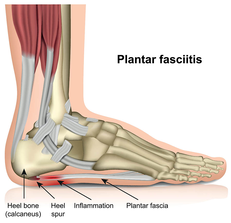 Imagine waking up in the morning. You roll over to turn off your alarm clock, throw off the covers, stretch, and sit up, but just as your set your feet on the floor, pain like fire spreads from your heels and across your feet. That’s the experience of many during pregnancy. This is also a condition that is common with athletics in children and adults. You're not alone, 1 in 10 people will experience plantar fasciitis in their lifetime and many treatments can be ineffective. Symptoms and Causes Plantar fasciitis is heel pain that can extend into the arch of the foot. This pain is often worst when you get up in the morning, at the end of a long day, or after some form of activity. Plantar fasciitis occurs when your plantar fascia (a ligament in the foot that connects your heel bone to the base of your toes) is damaged or torn, causing inflammation and pain. When you sleep, your plantar fascia naturally shortens and when you take those first few steps in the morning, it creates a sudden tension in the ligament, causing pain and discomfort. Plantar fasciitis is considered an overuse syndrome, meaning that it is typically caused by increased workload on the feet. Starting a new job that requires you to be on your feet all day, a sudden weight gain or even pregnancy can increase the workload on your feet and lead to plantar fasciitis. Those with plantar fasciitis describe soreness on the bottom of the heels, which can impact a person’s mobility in a number of ways. Treatment for Plantar Fasciitis If You Have Had Other Treatments for plantar fasciitis such as orthotics, physical therapy, splints, braces stretching and over the counter anti-inflammatories there may be another option: Shock Wave Therapy. What is Shock Wave Therapy? Extracorporeal shock wave therapy (ESWT) is a noninvasive treatment that involves delivery of shock waves to injured soft tissue to reduce pain and promote healing. Dr. Josh has utilized this on many patients who present with chronic tendinopathy that hasn't responded to more-conservative treatments. Often difficult to treat, chronic tendinopathy is characterized by localized pain and pathological changes to a tendon. The condition affects athletes and nonathletes alike. Who is a candidate for ESWT? The Food and Drug Administration has approved the use of ESWT for the treatment of plantar fasciopathy. Multiple high-quality randomized clinical trials have provided substantial evidence that ESWT is a safe and effective noninvasive option for treating tendinopathy throughout the musculoskeletal system.
0 Comments
The practice of assigning a specific due date to a pregnancy can have negative effects on both the expectant mother and the child. While it is important to have a general estimate of when a baby will be born, the current emphasis on a precise due date can create unnecessary stress and pressure for pregnant women and may even lead to negative health outcomes. One of the main problems with due dates is that they are often based on a one-size-fits-all model that does not take into account individual variations in pregnancy. It is normal for babies to be born within a range of two weeks before or after the due date, but many women feel pressure to have their babies on the exact due date. This can lead to unnecessary medical interventions, such as inducing labor or scheduling a cesarean section, in an attempt to meet the due date. These interventions can carry risks for both the mother and the baby and may not be necessary if the pregnancy is allowed to progress naturally. Another negative effect of due dates is the way they can create unrealistic expectations for pregnancy and childbirth. Many women feel pressure to have a "perfect" pregnancy and childbirth experience, but the reality is that every pregnancy and delivery is unique and unpredictable. This pressure can cause unnecessary stress and anxiety for expectant mothers and may even lead to feelings of failure or inadequacy if the pregnancy or childbirth does not go according to plan. Instead of focusing on a specific due date, it might be more beneficial to adopt a due month approach to pregnancy. This would allow for more flexibility and recognition of the individual variations that can occur during pregnancy. It would also take the pressure off of expectant mothers to have their babies on a specific date and allow for a more natural and healthy pregnancy and childbirth experience. Dr. Joshua WelchDr. Josh lives, works, and plays in the Sierra Mountains. He is focused on creating a community of families that live outside the constraints of modern life. |
AuthorLiving, Working, and Playing in the Sierra Mountains. Helping to create: Life, Health, and Community. Archives
January 2023
Categories
All
|
 RSS Feed
RSS Feed

